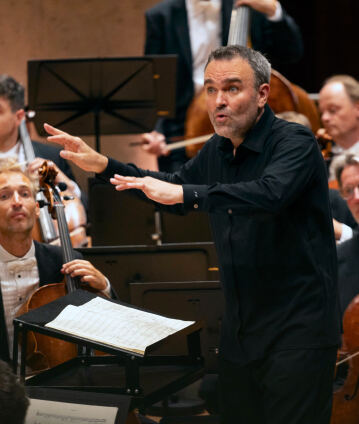Jörg Widmann with Felix Mendelssohn

Composer, clarinettist and conductor Jörg Widmann regards Mendelssohn as one of the greats of music. And he sees parallels with his own works, especially the “fascination with speed, instrumental colours and fast-paced changes of mood in quick succession”. He conducts Mendelssohn’s majestic Reformation Symphony and works of his own: his overture Con brio, the Fantasy for Clarinet and the Second Violin Concerto, with his sister Carolin Widmann.
Jörg Widmann is one of the most sought-after composers in Germany – and also a leading clarinetist and conductor. Here, the 2023/24 season’s Composer in Residence presents a kind of calling card and his compositional credo: to continue tradition through the new.
His concert overture Con Brio alludes to his idol Ludwig van Beethoven. Widmann quotes chord sequences and rhythms from the Allegro-con-brio movements of the Seventh and Eighth Symphonies, then defamiliarises them and leads them, as he says, into a “rage with rhythmic urgency”, which involves the sounds of breathing from the wind instruments, wild string glissandi and ingenious ways of playing the timpani.
The composer wrote the Violin Concerto No. 2 for his sister, violinist Carolin Widmann. Here he harks back to the virtuoso concertos of the Romantic period. In the second movement (Romanze), the violin only hesitantly develops a broad melody, which resolves itself into virtuosity in the last movement.
Widmann’s early Fantasie for Clarinet solo is a tongue-in-cheek commentary on the New Music scene. The opening theme is borrowed from Igor Stravinsky’s ballet Le Sacre du printemps and then cheekily steps into high gear – with all kinds of and almost impossible playing instructions.
Felix Mendelssohn was just 20 years old when he wrote his “Reformation” Symphony. The occasion was an anniversary celebration of the Protestant faith, but the premiere was delayed owing to revolutionary unrest. Beethoven was also a model for Mendelssohn: his symphony contains echoes of Beethoven’s Seventh. In addition to quotations from sacred music, in particular the chorale “Ein feste Burg ist unser Gott”, whimsical dance rhythms of the Reformation era appear – the seriousness of the anniversary mixes with youthful joie de vivre.
© 2023 Berlin Phil Media GmbH
Related interviews